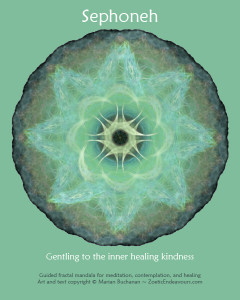 In a recent blog post titled “Why Do We Do the Things We Do?”, my friend Bonnie talks about the intention to “save the world” or “create a better world” being central for many social activists, but asks “Is it sustainable?” and explores activist burn-out and what it is that moves one to take action. I was going to comment on the post itself, but it turned into something a little longer, so I thought I’d post my thoughts here instead.
In a recent blog post titled “Why Do We Do the Things We Do?”, my friend Bonnie talks about the intention to “save the world” or “create a better world” being central for many social activists, but asks “Is it sustainable?” and explores activist burn-out and what it is that moves one to take action. I was going to comment on the post itself, but it turned into something a little longer, so I thought I’d post my thoughts here instead.
I think the “save the world” motivation deserves some introspection. Is there only one desirable way for the world to be? Who and what need saving? In what ways are they not able to save themselves and require your help? When you take action in the name of “a better world,” are you seeking win-win resolution for all involved, or is your mindset adversarial? How does that impact your effectiveness?
Years and years ago when I was taking yoga teacher training, a co-trainee talked of how the peace activists in her social circle were so angry, not at all peaceful in their ‘demands’ for peace. It highlighted the need to be self-aware and engaged in a deeper perception than just at the social justice level.
In terms of burn-out, one thing that seems relevant is the yogic teaching of detachment from the fruit of one’s actions: it’s not that you don’t act, it’s that you take the action that you are moved to take but leave it up to the universe as to how things will unfold thereafter. Of course, each new moment is a new opportunity to be moved to take a new action, and how you are moved will depend in part on how things have unfolded by that point. But it needn’t be an attempt to force the universe into a preconceived shape, it can be much more flexibly responsive, moment by moment. And it needn’t bring you down to see that the shape the universe takes is different from the one you would have preferred.
As far as I’ve observed and experienced, suffering always comes from resisting what is. It doesn’t mean we should resign ourselves to things being a certain way and not work for change. Non-action is as much an influence as deliberate action, and there is no escape from our part in co-creating what is. Change happens whether we contribute to it in conscious ways or allow a given momentum to proceed unchecked. The question is simply what form the change will take: will a “problem” grow worse or will it be “resolved” by taking a different path? Either way, it’s not possible for it to remain statically identical from one moment to the next.
Some might argue that there is no change if the problem is still there in some form – that, for all intents and purposes, it can indeed remain static and unchanged, neither better nor worse. But I want to invite you beyond the semantics to what I’m pointing at: life unfolds, each moment is new, and power is only ever in the Now. Letting go of the resistance to what is, doesn’t mean giving in or giving up, resigning oneself to having no control, no choice, no impact. It simply means being present in each new Now, responsively acting as needed within the limits of what we’re able to do at that time. Our actions are most conscious when informed by a perceived bigger picture and an intended result, but they’re not made more effective by attaching excessive importance to our version of the picture being the “right” one and the result needing to conform strictly to our hopes or expectations. On the contrary, that kind of insistence can be counter-productive by tying up our emotions in ways that block our ability to remain open-minded, be perceptively responsive, and take action that’s tailored to the situation.
Bonnie asks, “How might our lives be different if each action stemmed from the simple pleasure of doing it?” But I question whether that’s even possible. There are too many situations in which something needs to be done that just wouldn’t naturally involve any “simple pleasure” in doing it. So there would either have to be a psychological contortion to force it to feel like a pleasure to do, or else it wouldn’t get done and there would be undesirable consequences.
While there is indeed a way to take appropriate action without involving the conscious mind, it involves a meditative state that most people have never experienced, and those who have may not always be able to count on it for all decisions and actions. In practical terms, then, I think it’s appropriate to have a desired result in mind for one’s actions.
So how do we intend a result without getting caught up in expectations that can be disappointed, hopes that can be dashed, energy that can be too conditional on a superficial definition of success? I believe the answer is to hold our preferences lightly – not as deep desires that give us a desperate compulsion and a strong fear of failure, but as a gentle guidance system that gives our actions coherence.
Suffering arises and energy becomes stuck if we insist on change coming in the exact way we prescribe. We may ‘demand’ peace in angry ways, never recognizing that we are embodying the very thing we purport to be trying to eliminate. But if, on the other hand, we give ourselves permission to hold only lightly to a provisional perception of the bigger picture and our preferred future, we can move into action that is aligned with our deepest values without destroying the body-mind-spirit balance of our own inner selves.
